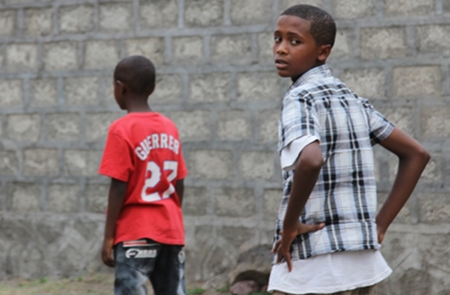June 13th, 2012 — 10:58am
It’s 4:30am here in the Lemlem neighborhood of Debre Zeyit, Ethiopia. Most of the dogs stopped barking sometime after 3, and the predawn quiet has settled in. I think the whole world takes this silent pause before dawn. Just another thing we all have in common.
We have a full day planned and I’ll be tired later if I don’t go back to sleep. My mind is busy trying to wrap itself around all the newness of gifts like these…
Tekele gave me warmth. He presses his face and neck beside mine and holds me tightly in an uninhibited embrace mere seconds after meeting me. He doesn’t know me, he wasn’t expecting me. There’s no particular reason he should care about me, but he does. He reaches out to me with a fearlessness i want for myself. Tekele is an Ethiopian man with short gray hair and a healthier figure than most people here. I imagine he eats better than most because he has a good job as a teacher of leadership, research methodology, and English. As I sit through, and he eagerly drinks in, a lengthy church service in Amharic, a language I know literally three words of, he mercifully passes me notes with English headlines from the lyrics and sermon content. My favorite says “This is no time for sleeping or passing the time in idleness. Bear fruits!”. With great energy and generous sprinkling of echoed Amens, the Ethiopian preacher thousands of miles from my home and completely outside my culture was articulating a concept that touches deep convictions in me.
Ebenezer gave me inspiration. He sits next to me on a couch in the children’s home where he lives with nine other children and two foster moms. He’s 15 years old with a face that speaks of total sincerity. Like many here he is very thin and looks young for his age. He’s energetically eager and obviously smart. While we talk I’m eating popcorn one of his foster moms has popped for us on a small charcoal fire in a pot nearby. Now she’s roasting coffee beans in a small pan over the same coals. We’re here for this coffee ceremony which I gather is a way of formally welcoming us to town

Ebenezer
He tells me about civics class and describes in detail the legalities of how Ethiopian citizenship is obtained by birthplace, blood relationship, or naturalization. He also comments on the legalities of American citizenship. Then using considerable time and energy he asks me a question he has been unable to find an answer to. If an Ethiopian woman marries and American man in Ethiopia, and gets pregnant with his child who is born over Germany while on an airplane flight from Ethiopia to the US, what citizenship(s) will the child have? This is not a game of stump the teacher, he is intensely curious and he really wants to know. He is earnestly hoping someone in our group of Americans will know the answer and he is disappointed that we don’t. He said it is not addressed in the Ethiopian constitution and he doesn’t have access to the German and American constitutions to see what they say. Ebenezer wants to be a doctor, but his first love is soccer. He says when he watches soccer it gives him such joy that he wants to play like that someday. He says he will leave it up to God which career he follows. I promised him I’d try to find an answer to his citizenship question.
The sun will be up soon and I never did go back to sleep. I’ll post this the next time I have Internet access. Today we plan to participate in art and sports classes at BCI Academy, the private school part of Blessing the Children International. Word is we might play a game of soccer against the students. My money is on the kids in that game.
June 7th, 2012 — 6:00am
Edgar Papke is a big and friendly man with an accent that’s a little German and a little New Jersey. In a former life he was a chef at top-rated restaurants. He loves cooking and it’s a joy to hear him passionately talk about food. His round face and frequent smile make him look like a chef to me.
In this life Edgar is an organizational psychologist and expert on communication and culture. If you talk to him, you’ll find that he listens with a quiet openness that is at first unnerving. No matter what statement you lead off with, he will dig deeper and want to know more. I realized right away I sometimes lead off with statements I didn’t think through.
I think I’m accustomed to people who are in such a hurry to give their opinion, they don’t put me in a position to fully explain myself. When Edgar really listens, and he always does, I find myself peeling back layers of my own hurried thinking and finding out what’s really underneath it all.
His listening techniques are simple – express your intention for the relationship and the conversation, and inquire with true openness, without bias or questions designed to lead to your pre-formed conclusion. (It turns out there are about 100 ways to use a question as a way to sneakily say something instead of openly inquiring.) Leave enough silent space for the other person to fully express themselves, all the way to the deeper truths behind what they are saying.
These simple techniques are powerful. Relationship-changing, performance-changing, career-changing kind of powerful.
As I reflect on that wonderful weekend of practicing and indulging in great communication, I realize just how rare good listening is. I certainly don’t listen well most of the time. I feel like I’ve been getting by on PB&J-level listening and just discovered there’s a whole world of filet-mignon-level listening out there. This is gonna be big.
May 24th, 2012 — 5:16am
You can’t make a choice about how to respond unless there is a moment of awareness between stimulus and reaction. Deliberate personal change requires making different choices than you usually do, and different choices require awareness.
For example, if I instinctively back down from confrontation without self-awareness that I’m doing that, I can’t choose a different response next time.
Many blind spots are so wired into our brains, only outside feedback will make us aware of them. Sometimes this is feedback from physical reality. (“Every time I talk to this person I get a headache.”) More often it’s a credible person telling us what they see. (“I think you’re avoiding a direct conversation with that person without even realizing it.” or sometimes not so subtle “That was pretty weird how you responded there.”)
We need other people to help us see the truth about ourselves. Friends, mentors, therapists are all valuable sources of that feedback.
Get around people who give you honest feedback. Listen and learn about yourself, and use that awareness to pause and make choices. This is a major mechanism of personal change.
May 14th, 2012 — 6:00am
Growth is a continuous process, but sometimes it’s more visible that others. Construction is one of those times. Here’s a shot of a new warehouse going up at my companies’ main location. This warehouse is the last step in a three-phase renovation and construction process giving ATS much-needed room to grow.

One of the most exciting parts — this entire facilities expansion process has been managed not by me, but by an employee who’s skilled in the area of construction management. When I delegated that to him I had no idea what a full-time job it would be. I couldn’t have done it myself.
May 2nd, 2012 — 8:43am
Twice recently I struggled too long to make a major decision. One involved a difficult HR situation, the other involved a significant financial decision. I went over and over the options logically in my head. I considered my advisers’ points of view. I thought about what the other people involved wanted. I thought about what my dad would say.
I realized I was going in circles, ruling out every option because I didn’t like something about it, and I knew somebody else wouldn’t like it.
I was being a pinball, letting myself be bounced from one obstacle to the next and settling nowhere. Pinballs don’t make choices, they just react to whatever pushes them.
Stating the obvious: that’s not leadership.
Here’s the thought process that helped me get a grip:
- I am being a pinball, and that’s not how I want to lead.
- I will be the decider in this situation. It is my place and I will take it.
- This is not a no-brainer situation. All options have downsides. I am willing to choose something less than ideal.
- My choice will be criticized by people around me. Those critics might even turn out to be right. I am willing to take those risks. I will still be the decider.
From there I moved on to normal strategic thinking about options, outcomes, and obstacles. I decided, and I like the results.
Choose from the options you have, not the options you wish you had. Include the options that will get you criticized. Be a decider.


